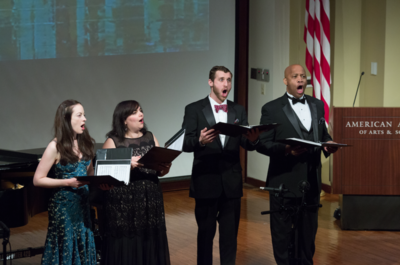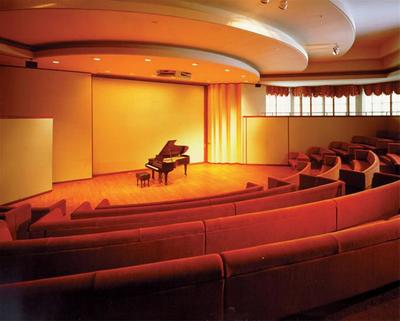An Evening of Entartete Musik with Cantata Singers

Cantata Singers Chamber Series in concert November 17, 2015. Photo: Martha Stewart
By Olivia J. Kiers
On this Friday evening in mid-November, in Cambridge, MA, certain things are expected: night falling early after the end of Daylight Saving Time, the sound of dried leaves scattering across side streets, and students’ excitement about the upcoming Harvard vs. Yale game. Yet in the wake of presidential election results few predicted, there is a difference to the atmosphere here as everywhere, and in the cozy warmth of the American Academy of Arts and Sciences lecture hall tucked in a quiet space between Beacon and Irving streets, a poignant journey into the past occurred on November 18: the Cantata Singers’ Chamber Series concert devoted to “Entartete Musik.”
Entartete musik—music labeled “degenerate” under the Nazi regime in Germany—is a depressingly wide-reaching category. As Chamber Series music director Allison Voth explained, some composers were targeted simply for being Jewish or having Jewish connections, while others were repressed for using music to expound political viewpoints such as Communism. “I think it’s an important concert,” Voth said. “We’re at an interesting time right now where we have a real shift in our politics… I don’t think it will effect out arts in such a drastic way—but politics do affect artists, and we need to remind ourselves of this.”
Voth’s organization of a program around “entartete” works lead to a fascinating time capsule of a concert. The choice to bookend the evening with pieces by Kurt Weill, the avant-garde theater composer who turned to Broadway after immigrating to the United States in 1935, was a wise decision. The Cantata Singers took the audience from an upbeat “Berlim in Licht” (Berlin in Lights) opener, all the way to the mournful shores of “Youkali,” the “land of our desires… [that] does not exist,” thus encapsulating the era’s turbulent highs and lows with appropriate respect.
The first half of the concert tested the Cantata Singers’ range of expression and the audience’s expectations with a series of little-heard gems, some of which recalled 19th-century romanticism while others were decidedly experimental. Hanns Eisler, whose Marxist beliefs placed him on the wrong side of both the Nazis and the U.S. Committee on Un-American Activities, was represented by pieces with delightful yet odd lyrics like “Die Zwei Trichter” (The Two Funnels):
Two funnels wander through the night.
Through their bodies’ narrowing shafts
white moonlight floods
silent and clear
on their
path
and so on
The high level of talent within the three female (Lisa Lynch, Jennifer Webb and Alexandra Whitfield) and four male (Brian Church, Eric Christopher Perry, Jason Sabol and Ron Williams) singers was evident throughout the evening, especially in this first half as they navigated challenging material. This comes as no surprise to David Hoose, music director of the Cantata Singers’ concert season. “From the beginning of Cantata Singers… the defining feature, aside from the high level of performance that the we’ve always brought to our concerts, has been a deep interest in a repertoire that has always been of great emotional and intellectual interest.”

Auditorium at the American Academy of Arts and Sciences. Photo courtesy Cantata Singers.
The second half of the concert featured works by Arnold Schoenberg, Weill, Wilhelm Grosz and others that evoked the cabaret and jazz zeitgeist of the ‘30s, with allusions to chorus girls and Metro Goldwyn-Mayer (in Grosz’ rollicking “Ballad of Sammy Lee”). More accessible, these songs allowed the singers’ stage presence to come alive, and strong acting was inserted into the performance. Still, there were many somber elements, inescapable signs of the times. “Caesar’s Death” from Weill’s Der Silbersee contains the lines
Let no man give way to the delusion,
That great power will protect his life:
Caesar won his empire with a sword,
And was murdered by a simple knife.
and Eisler resurrects the specter of World War I with his morbid “Ballade von de Krüppelgarde” (Ballad of the Cripple Brigade). “Art plays a huge role in helping us to understand our society,” says Voth. “I don’t think that is the objective of Cantata Singers, but certainly it’s nice when we have the opportunity to program works that do inspire deep thought about our political selves, and how art plays a role in our lives for the better.”
In addition to the Cantata Singers’ regular Concert Series, there are two remaining concerts in the Chamber Series: a selection of Yiddish art songs and cabaret music by American composer Lazar Weiner and German composer Kurt Weill on Friday, January 20, and works from the group of French radical composers know as Les Six on Friday, March 31. Both will be held at the American Academy of Arts and Sciences.
For more information, visit cantatasingers.org.
